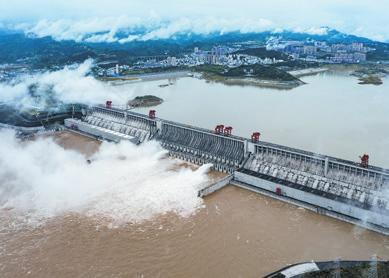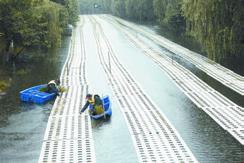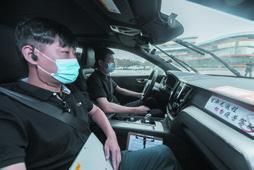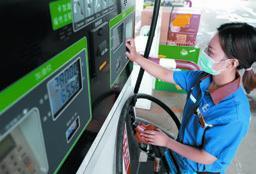CHINA’S VISION SHARED
2020-07-13

Six years after Xi Jinping: The Governance of China was fi rst published, the third volume has recently been released in Chinese and English editions. Published by the Beijing-based Foreign Languages Press, it is a collection of 92 articles, speeches, conversations and letters by President Xi Jinping between October 18, 2017 and January 13, 2020.
Compiled by the State Council Information Office, the Research Institute of Party History and Literature of the Communist Party of China Central Committee and China International Publishing Group, it follows the second volume launched in 2017.
Bracing for Flood
The Three Gorges Dam opened two spillways on June 29 to prepare for possible fl ooding, marking the fi rst offi cial fl ood discharge of the year by the worlds largest dam.
Chemical Transport
Local traffi c management departments launched a national campaign to improve the transport safety of hazardous chemicals, according to the traffi c management authority.The six-month campaign, scheduled from July 1 to December 31, aims to prevent the occurrence of accidents with mass casualties involving hazardous chemicals transport vehicles, said the traffi c management bureau under the Ministry of Public Security on June 30.
The campaign will target traffi c violations involving hazardous chemicals transport vehicles, including speeding, fatigue driving and illegal parking.
The bureau also called on local traffi c management departments to implement measures regarding certifi cate issuance and road inspection, strengthen traffi c control at key points and increase the frequency of inspections.
Test Flights
Chinas indigenously developed C919 large passenger aircraft has started high-temperature test fl ights in Turpan, a city known as the land of fi re, in Xinjiang Uygur Autonomous Region in northwest China.The test plane arrived in Turpan on June 28 and testing will last for a month.
The test fl ight team from the Commercial Aircraft Corporation of China, the manufacturer, decided to conduct the tests and collect performance data at Turpan airport after analyzing meteorological reports of airports nationwide, according to Wang Lifei, head of the airports safety and quality supervision bureau.
Turpan is known for its harsh desert climate, especially its extremely hot summer. Between June and August, the average temperature there can surpass 38 degrees Celsius.
The C919 conducted a successful maiden fl ight in 2017. Now the aircraft has started intensive test fl ights from various airports to make sure its performance can meet airworthiness standards.
Illegal Fishing
Chinese authorities on June 29 launched a campaign to crack down on illegal fi shing in the Yangtze River basin.Jointly deployed by the Ministry of Public Security and the Ministry of Agriculture and Rural Affairs, the campaign calls for strict enforcement of a fi shing ban on the main river and numerous natural waterways in the basin.
Police authorities along the Yangtze will organize a three-year campaign to combat illegal fi shing, Lin Rui, Vice Minister of Public Security, said.
Lin also demanded efforts to stop the underground industrial chain of illegal fi shing, transportation and business operations.
China began a 10-year fi shing moratorium from the beginning of this year in 332 conservation areas in the Yangtze basin, which will be expanded to all the natural waterways of the countrys longest river and its major tributaries from no later than January 1, 2021.
Lake Evaporation
Chinese researchers have estimated that the Qinghai-Tibet Plateau is witnessing about 51.7 billion tons of lake water evaporation each year, according to the website of the Chinese Academy of Sciences (CAS).Lake evaporation can infl uence basin-wide hydrological cycles and is a crucial factor in the loss of water resources of the plateau.
Researchers from multiple institutes, including CAS, Lanzhou University and Tsinghua University, used a combination of meteorological and satellite data to explore the ice phenology and evaporation amounts in 75 large lakes across the plateau.
They observed apparent variability of the evaporation amounts in their spatial distributions. Lakes with higher elevation, smaller areas, and higher latitudes are generally reported to have lower evaporation.
Dubbed “the water tower of Asia,” the Qinghai-Tibet Plateau provides water supply for many Asian rivers including the Yangtze, Yellow River and Mekong River. The lake areas of the plateau cover almost 50,000 square km.
Tighter Supervision
A new law stipulating stricter supervision and regulation of government employees behavior took effect on July 1.The law on administrative discipline for government employees is to punish improper behavior.
In addition to misconduct such as bribery, embezzlement and abuse of power already covered by current laws and regulations for government employees, the new law includes punishment for violating administrative discipline such as tampering with or faking personal information, failure to report such information as required by the code of conduct, and refusal to comply with rules regulating certain businesses undertaken by the families and close contacts of the staff.
Last year, an outline for the regional integrated development of the Yangtze River Delta, one of the countrys most economically active, open and innovative regions, was unveiled. The region produces about one fourth of the national GDP.
River Rice
Workers plant rice in a river in Huzhou, a city in Zhejiang Province in east China, on June 29. The new agricultural project will not only purify water but also produce high-quality rice.Stronger Policy
The Peoples Bank of China (PBC) on June 27 vowed stronger macroeconomic policy adjustment as well as better fi scal, monetary, and employment policy coordination and implementation to counter the impact of the novel coronavirus disease (COVID-19) pandemic on economic growth.The country will pursue a prudent monetary policy in a more fl exible and appropriate way, and attach greater importance to boosting the real economy and sustainable development, the PBC said in a statement released after a quarterly meeting of its monetary policy committee.
The countrys economic growth faces challenges as the situation of the global COVID-19 pandemic and world economic development remains grave and complex, the central bank said.
The central bank will use a variety of monetary policy tools and develop new ones to maintain liquidity at a reasonable and suffi cient level.
It will encourage fi nancial institutions to enhance support for the real economy, especially small and micro companies as well as private fi rms.
The country will further promote high-standard opening up of the fi nancial sector, while improving its economic and fi nancial management capabilities as well as those for risk prevention and control.
The central bank also vowed to deepen interest rate reforms and maintain the basic stability of the yuan exchange rate within a reasonable and balanced range.
Riding the Wave
Water sports enthusiasts paddle board on the Huyuan River in Huyuan Township, Hangzhou, Zhejiang Province in east China, on June 28. Local governments are working in collaboration to maximize the rivers ecological resources and promote local ecotourism.HK Credit Ratings
International credit rating agency Standard & Poors (S&P) affi rmed on June 26 its AA+ long-term and A-1+ short-term issuer credit ratings for Hong Kong Special Administrative Region (SAR). The outlook remains stable, and the transfer and convertibility assessment is unchanged at AAA, the agency announced in its latest report on Hong Kong.It said Hong Kongs economy will likely suffer another deep contraction this year as the COVID-19 pandemic has increased pressure on the services and trade sectors, and the fi scal defi cit is expected to widen with the rollout of additional fi scal stimulus.
“But for now fi scal buffers remain suffi cient to absorb the credit impact of these measures,” it pointed out.
The stable outlook refl ects S&Ps expectation that economic conditions will stabilize and recover from the pandemic and political developments between the Chinese mainland and the SAR, as well as between the United States and the SAR, will not fundamentally jeopardize Hong Kongs economic development.
“The stable outlook refl ects our expectation that Hong Kongs strong economic and fi nancial metrics will still allow the governments creditworthiness to withstand the fallout from prolonged social tensions and the COVID-19 pandemic over the next one to two years,” it said.
“It also refl ects our expectation that institutional changes as a result of the national security legislation will not affect Hong Kongs autonomy in setting economic policies as laid out in the Basic Law,” it added.
Under the “one country, two systems” principle, Hong Kong enjoys autonomy in important institutional matters that affect the governments creditworthiness, including the ability to manage its own fi nances and set macroeconomic, fi nancial and trade policies.
IPOs on STAR
The Shanghai Stock Exchanges scitech innovation board, commonly known as the STAR Market, has continued to drive the momentum of initial public offerings (IPOs) on the A-share market, according to the consulting fi rm Ernst & Young.It is estimated that 120 companies were listed on the A-share market in the January-June period this year, up 88 percent year on year, with total funds rising 132 percent year on year to nearly 140 billion yuan ($19.8 billion).
In the f rist half of 2020, IPOs on the STAR Market ranked f rist and second by deals and proceeds, respectively, among different boards on the A-share market, according to a report released by Ernst & Young on June 23.
Four out of the top 10 IPOs on the A-share market were from the sci-tech and innovation board, raising a total of 13.8 billion yuan ($1.95 billion).
The STAR market was launched in June 2019 in a bid to support companies in the hi-tech and emerging sectors. It aims to ease listing criteria but adopts higher requirements for information disclosure.

Autonomous Ride
A tester (front) holds a device to record data in an autonomous vehicle in Shanghai, east China, on June 27. Ride-hailing giant Didi Chuxing launched the trial run of its self-driving ride service on designated test roads in the eastern metropolis of Shanghai that day. Users who have registered in advance can hail an autonomous vehicle for a free ride within the 53.6-km designated roads in Jiading District.Economic Outlook
The Chinese economy is showing signs of a relatively strong and sustained recovery and would see growth in the second and following quarters, according to a think tank report released on June 20.The China Macroeconomy Forum (CMF) said in the report that it expects the economy to grow by 2.5 percent, 6.5 percent and 7.5 percent year on year in the second, third and fourth quarters of 2020, respectively.
Upon completing the initial stage of economic recovery by promoting production resumption and restoring the supply side of the economy, China is entering the next stage of pushing demand expansion and lubricating the circular fl ows of the economy, the CMF report said.
As one of the fi rst economies to contain the epidemic and restart the economy, Chinas recovery and re-consolidation of economic foundations has a guiding signifi cance for the world economy, it said.
For 2020, Chinas annual GDP growth is likely to reach around 3 percent, the CMF said, citing support from government policies and the new round of reform.
However, the report warned that instead of supply chain disruption, weak demand has become the greatest obstacle to Chinas economic recovery. It urged efforts to fully expand domestic demand and restore the regular market cycle.
The CMF also noted other risks and challenges such as uncertainties in the development of the pandemic, the complicated external environment, obstruction in policy transmission and a slowdown in potential growth.
Liu Xiaoguang, a researcher with Renmin University of China, one of the sponsors of the forum, suggested that rather than short-term quantitative goals, Chinas economic policies should focus on mid- and long-term structural changes to facilitate future economic prospects.
Commuter Tram
Colombias state-owned Regional Railway Company on June 24 signed a contract with China Civil Engineering Construction Corp.(CCECC) for a commuter tram serving the capital Bogota and its outlying areas.Colombian President Ivan Duque was present when the representatives of the two companies signed the contract for construction to begin on the West Regiotram, which will connect communities in Cundinamarca, where Bogota is located, with the capital.
Duque called the signing a“historical event” that marked “the beginning of the dream that for years Cundinamarca has yearned for, which will improve the quality of life, open up opportunities and is moving forward in the midst of the COVID-19 pandemic.”
The electric-powered tram will connect Bogota with Funza, Mosquera, Madrid and Facatativa, communities to the west of the capital.
The project will benef ti the over 11 million residents of Bogota and its surrounding areas, serving more than 130,000 passengers a day.
